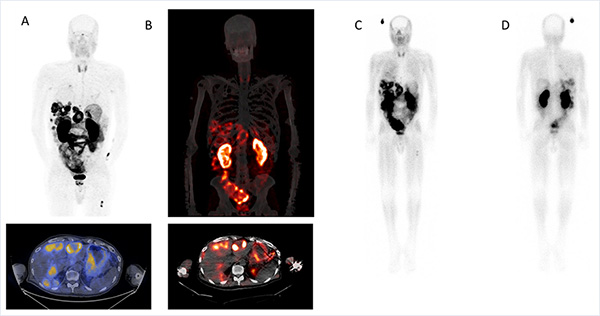Julie Sutcliffe was presented with the 2023 Society of Nuclear Medicine and Molecular Imaging (SNMMI) Henry N. Wagner, Jr., Image of the Year award for her leading-edge “theranostics” phase one clinical trial in patients with metastatic pancreatic cancer. Theranostics is the combination of diagnostics and therapeutics.
Sutcliffe is a professor of internal medicine and biomedical engineering at UC Davis. The Sutcliffe Lab research team bridges the spectrum from benchtop discovery to clinical trials, with the goal of improving patient care and transforming how cancer is detected and treated.
She is also director of the cyclotron and radiochemistry facility at the UC Davis Center for Molecular and Genomic Imaging as well as co-director of the center. She is an SNMMI fellow and additionally a fellow of the World Molecular Imaging Society and the American Institute for Medical and Biological Engineering.
Sutcliffe’s SNMMI award was the result of her team’s first-in-human evaluation of the novel theranostic pairing of two radiolabeled peptides: 68Ga-DOTA-5G as the diagnostic and 177Lu-DOTA-ABM-5G as the therapeutic agent. 68Ga-DOTA-5G successfully detected metastatic pancreatic cancer, and 177Lu-DOTA-ABM-5G allowed for targeted treatment of the disease.
Sutcliffe also receives $500,000 Mars Shot research grant

Sutcliffe was also presented at the annual SNMMI meeting with a $500,000 grant from the 2023 Mars Shot Research Fund. The fund recognizes individuals who are making a transformative impact in the field and elevating the value of nuclear medicine and molecular imaging. Sutcliffe’s Mars Shot grant was awarded based on her proposal “Evaluating the Integrin αvβ6-targeted Molecular Imaging Agent 68Ga-DOTA-5G as a Diagnostic for Lobular Breast Cancer.”
“This study will enable patients to receive more effective imaging that will improve their care by detecting disease earlier,” Sutcliffe said. “We, therefore, expect this molecularly targeted approach to have an immediate and much-needed benefit for this subpopulation of patients.”





